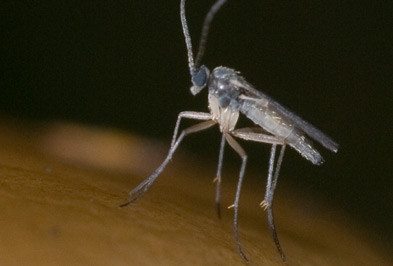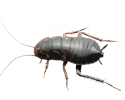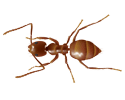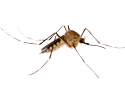Gnats
What Do Gnats Look Like?
Adult gnats are very small- typically less than 1/4 of an inch long; they can be yellowish, tan or dark brown in color. Gnats have distinctive long legs and are weak fliers. The common gnat can often be identified by seeing swarms of gnats are often seen at dusk, these are the males of the species gathering in mating groups.
Why Do I Have Gnats?
Gnats are at their highest numbers in the summer when the weather is humid and moist; their activity generally decreases outside during the cooler dryer months. Some gnat species are attracted to homes and properties that have high levels of moisture, especially in the soil (fungus gnats).
Gnats will enter into your home while searching for food; they may also enter into homes on plants that are already infested with gnats or their eggs, or on items purchased from the store that are already infested. Gnats can reproduce very quickly so just a few can quickly turn into many and can become a huge nuisance in and around your home.
What Are The Feeding Habits Of Gnats?
Gnats can either be biting or nonbiting depending on the species. Gnats can be found feeding on plants, soil, fungus, other insects, or even on blood.
What Threats Do Gnats Pose?
Fungus gnats do not bite or sting but their larvae can cause damage to your houseplants and seedlings as they feed on the roots or burrow into their leaves and stems. Other species of gnats will bite and feed on the blood of people, pets, and livestock. Some species of gnats (black gnat) can spread a variety of dangerous diseases including river blindness.
How Do I Control Gnats?
Gnats are not a pest that many homeowners are successful in eliminating. Do-it-yourself methods of pest control often times prove ineffective and they can expose your family to harmful chemicals if not handled correctly. To prevent these pests from laying eggs it is best to try and eliminate water sources from your property; even stagnant water is attractive to a female, adult gnat. You can also water your plants less. Reducing the amount of water normally used for your plants can help dry the first couple of inches of soil, which will in turn keep any larvae from developing into gnats. However if you have an existing gnat problem it is best to contact a professional for help. The professionals at Holder’s understand the behavior patterns of these pests. For effective pest methods that can help get rid of pests, such as gnats; contact Holder’s Pest Solutions today!
How Do You Prevent Gnats?
Preventing gnats can be a difficult task but there are some things that you can do around your home or property to help control and prevent them. The best way to prevent gnats is to make sure that plants and gardens are not overwatered; and make sure that gutters are free of clogs and working properly to direct water away from your home. Inspect door and window screens checking that they are intact and that any gaps found around window and doors are sealed-this will help to prevent gnats from entering into your home. Keep fruits and vegetables in the refrigerator and regularly remove trash from your home. A professional will be able to identify problem areas and give a proper diagnosis of the situation.
Related Post From Our Blog
Forecast Calls for Increased Flying Pest Population in Houston
With warmer, wetter spring weather on its way, we can expect to see a higher than normal flying pest population this year. Houston’s winter weather brought warmer than normal temperatures – who remembers the 80-degree [...]
Stinging Insects and What to Do About Them
Justin Schmidt is arguably the most dedicated entomologist in his field. He finds stinging Hymenoptera – bees, wasps, etc. – so fascinating that he willingly lets these creatures pierce his skin in order to fuel [...]
Has This Wet Texas Spring Brought You New Pests?
Wet weather drives pests into homes, and moist basements make them never want to leave. If you understand these two principles, you may actually be able to reverse the infestation that may already be happening in your home.







